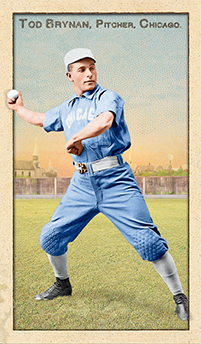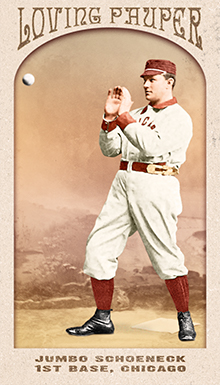
- Series: 1880s: Loving Paupers
- City: Chicago
- Team: Maroons
- League: Western Association
Lewis N. Schoeneck (1862-1930) came by his nickname honestly, standing 6'2” and 223 lbs, a true Gargantua in his day. Despite his size and presumed strength, Schoeneck proved better suited to the minors than the big leagues. His decade in pro ball was mostly in those smaller circuits and, apart from his season with the Union Association in which he played for two clubs and saw pitching a decided cut below true major league caliber, his batting average was consistently much higher in the minors. This is, of course, not unique by any means and the big first baseman was able to perform very well for most of the franchises he played for. Thanks to the renegade UA that siphoned off a lot of upper-tier minor league talent to make its attack on National League dominance in 1884, many of its players enjoyed one sunny season hitting well above their pay grade. Jumbo, for example, was in the top ten in the league in many offensive categories, including BA, OBP and Slugging Percentage. Since his only other major league time came four years later with the Indianapolis Hoosiers of the NL, his summer of love with the Pittsburgh Stogies and Baltimore Monumentals (never mentioned in connection with baseball greatness) enabled Schoeneck to “retire” with a career major league batting average of .283. Not a bad accomplishment to tell the grandkids.
- During his first of two seasons with the Hoosiers in 1888, Jumbo was summoned to relieve in two games. He hurled 4.1 innings, surrendering five hits and four runs without a decision. All of the runs were unearned giving him a phenomenal career ERA
- Neither of Jumbo's UA clubs performed too badly, but all of the league's other teams were crushed by the St. Louis Maroons who made mincemeat of the competition. The lop-sidedness of the runaway Maroon steamroller played a large part in demoralizing the fans and leading to the league's demise after that storied '84 campaign. St. Louis was a big winner in another, more important way. Their achievement led to the franchise graduating to the NL in 1885 where they became cellar-dwellers
Auction History
Cartophilia
Old Judge Pose: 404-4
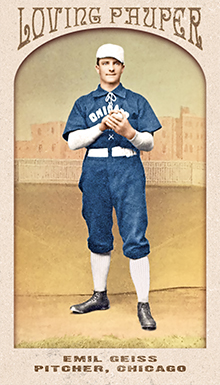
- Series: 1880s: Loving Paupers
- City: Chicago
- Team: White Stockings
- League: National League
Emil Geiss (1865-1911) emigrated from his birthplace, Villmar Germany, to Chicago. The youngster began his experience in professional baseball out in Colorado with the Pueblo Pastimes of the CO State League in 1885. The scanty records for minor league play in those days record Emil started two games, finished them both and went 1-1. There is no data for Geiss’ activities the following year, but one might suppose he did something somewhere to impress the Chicago White Stockings as the National League power thought fit to sign Emil for the ‘87 season. Whatever Cap Anson’s hopes were, they died aborning as Geiss languished with the team. He got shelled in his one start (11 runs, eight earned) and not only left the major leagues, he left his adopted land. Geiss signed the following two seasons with London Ontario Canada’s Tecumsehs of the International Association and stayed for the 1889 campaign when the Tecumsehs joined the International League. In those two years Geiss was 21-21 . But for his sole outing in Chicago, he would have completed his pro tenure with a symmetrical record of 22-22.
- There is no doubt Emil belonged in the pitcher’s box as his hitting gave no indication he could perform anywhere else. He never cracked the .200 mark and was one for 12 with the White Stockings. His three errors in his brief time in the majors suggest it wasn’t just his bat that would be a detriment to longevity at that level
- The reason Geiss had twelve at bats in Chicago is that Anson put him at first base and second base in two other appearances
- Emil’s older brother Bill also saw major league duty, playing two seasons. He debuted with Baltimore in the American Association in 1882 and then joined the Detroit Wolverines of the NL in ‘84
Auction History
Cartophilia
Old Judge Pose: 182-2
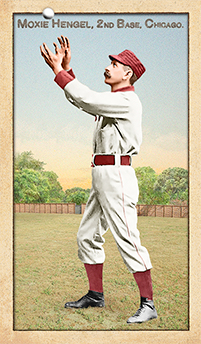
- Series: Beginnings: 1880's
- City: Chicago
- Team: Maroons
- League: Western Association
Emery J. Hengel (1857-1924) had brief stints in major league baseball during parts of the 1884 and 1885 seasons. Moxie signed on as an infielder with his hometown's entry in the upstart Union Association, whose Browns sought to compete with the renowned Chicago White Stockings. The experiment failed and, by August, the club had moved to Pittsburgh (as the Stogies) and lasted until September 18. Many of the players went to Baltimore's Monumentals, but Hengel landed in the Twin Cities with the St. Paul Saints (White Caps). That franchise's contribution to the UA amounted to eight games in total, all on the road. Moxie's anemic .152 average might have signaled a quick end to his would-be career, but he got one more chance - this time with the National League's Buffalo Bisons in what would be their final campaign in the majors. That 1885 season saw Hengel teaming with some real stars: first baseman Dan Brouthers, second baseman Davy Force, shortstop Jack Rowe, third baseman Deacon White, outfielder Hardy Richardson and pitcher-manager Pud Galvin were all on hand. Despite all that talent, the Bisons ended the year ahead of only the woeful St. Louis Maroons and were folded into the Detroit Wolverine club the following season. By this time, Moxie had achieved the dubious distinction of having been on the final rosters of four straight failed ball clubs within two years - and Moxie's days in the Show were over. Undeterred, Hengel returned to the minors, playing for the Utica Pent-Ups, Chicago Maroons, Minneapolis Millers and others before closing his pro tenure with the Minneapolis Minnies of the Western League in 1894 at age 36. In '92 Moxie made a stop in Michigan with the Ishpeming-Negaunee Unions of the Wisconsin-Michigan League, a team that, thankfully, never had to recruit a radio broadcaster.
- Moxie's first major league manager was Ed Hengel. One of three managers for the Chicago Browns in 1884, Ed managed the team to 34 wins and 39 losses. Ed was also born in Chicago and just two years before Moxie. While it's hard to imagine the two were not related, research has not revealed any familial connection.
- Moxie's batting average for his three big league teams was .180. He hit no home runs but did manage three doubles and two triples in his 35 games
- Moxie may have been a better leader than ballplayer: He managed the Chicago Maroons in 1888 and the Minneapolis Millers (road games only) in 1889
- The first release of this card (January, 2017) was likely an error: Hengel was misspelled as "Hengle." This is actually a common mistake for Moxie and it has caused a fair amount of confusion through the years. The Old Judge editors spelled his name "Hengle" and his Wikipedia entry uses the two spellings interchangeably. Deeper research indicates that "Hengel" is the most likely spelling. All subsequent releases of this card will feature the name "Hengel."
- Series: Beginnings: 1880's
- City: Chicago
- Team: White Stockings
- League: National League
Charles Ruley Brynan (1863-1925) had two cups of coffee with major league clubs separated by three years. He was primarily a minor-league, right-handed pitcher with quick looks by two National League teams: the Chicago White Stockings in 1888 and the Boston Beaneaters in 1891. Along the way “Tod” played with two Southern Association teams in ‘86, the Nashville Americans and Memphis Grays followed the next year with the Duluth Freezers. In ‘88 Brynan played for the Minneapolis Millers and St Paul Apostles before getting a late-season chance with Chicago where he was 2-1 with a high 6.48 ERA. He fared worse with Boston, failing to get out of the first inning after giving up six.
- The remainder of his service had been with the Milwaukee Brewers, Des Moines Prohibitionists and Grand Rapids of the Michigan State League in 1889
- Brynan’s career mark in the minors was 31-39 with a 3.00 ERA
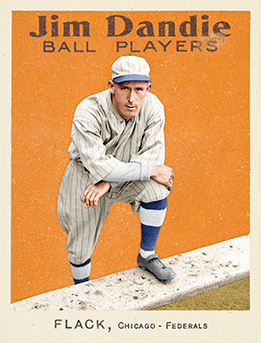
- Series: Jim Dandie Feds
- City: Chicago
- Team: Whales
- League: Federal League
Max John Flack (1890-1975) was a left-handed outfielder who played a dozen seasons in the majors in Chicago and St. Louis. He compiled a career average of .278 with little power but considerable speed, stealing 200 bases over his tenure. In recent years a shadow has been cast over this journeyman's reputation as his status as the “goat” of the 1918 World Series has been looked at in more sinister terms with the uncovering in 2007 of documents pertaining to the Black Sox scandal. An affidavit by Ed Cicotte indicates he and his wayward teammates felt “inspired” by the Cubs' loss to Boston the year before. Flack's dubious performance in the Series made him an object of suspicion. He remains the only player to be picked-off twice in a World Series game. His throwing error in game six provided the margin of victory to Babe Ruth's Sox. However, a review of the box scores for the '18 Series shows the Cubs were charged with six errors and Flack committed only the one that led to Boston's only scores in the finale (in the third inning). There were a number of noteworthy aspects to that Series beyond speculation of misconduct. Due to the war, it became the only Fall Classic to be played entirely in September. The Cubs eschewed their home park (later to be named Wrigley Field) in favor of vaunted Comiskey Park (“The Baseball Palace of the World”). Although it would not be named the national anthem until 1931, game one was graced with the first performance of the Star Spangled Banner at a major league game. And, of course, it would be mourned by Boston fans for another 86 years as the last championship as the Curse of the Bambino took hold. So, if Max did engage in mischief, he did so on a grand stage, but there is nothing but unfortunate circumstance to implicate him.
- Flack had debuted with the Federal League's Chicago “Chi-Feds” (later the Whales) in 1914
- He remained in town with the Cubs following the demise of the upstart league the next year, playing regularly for six seasons before moving to the Cardinals as a reserve for four more



